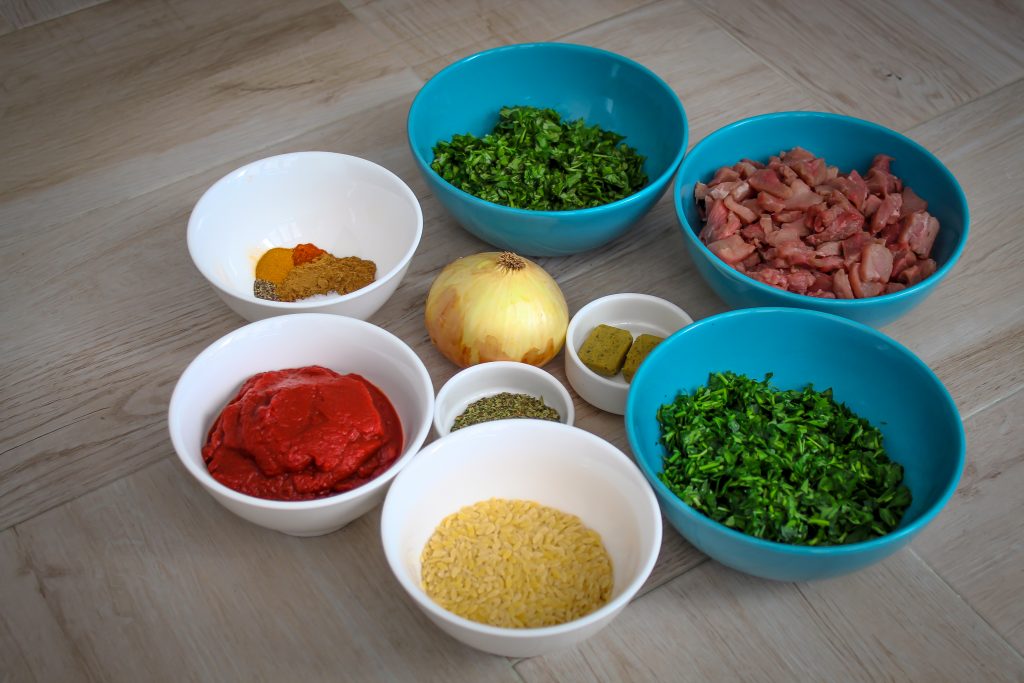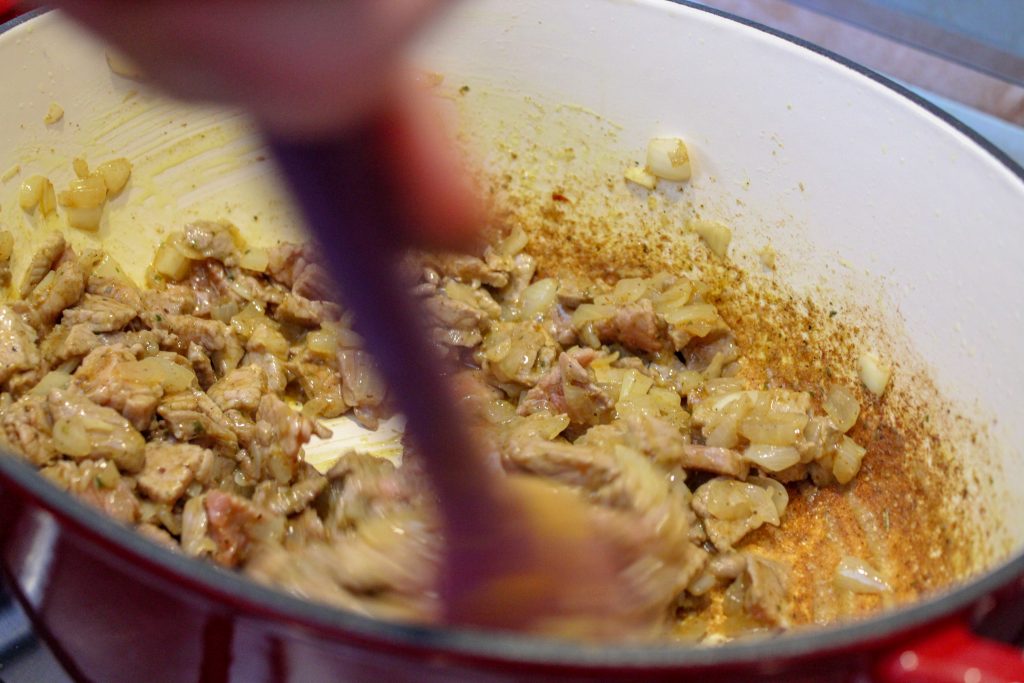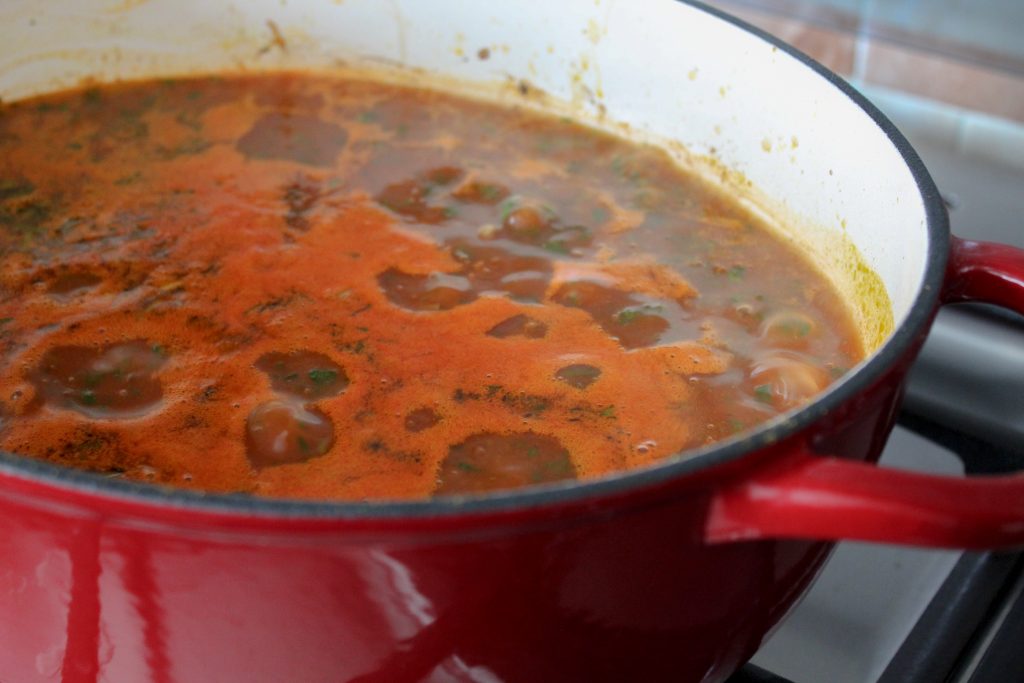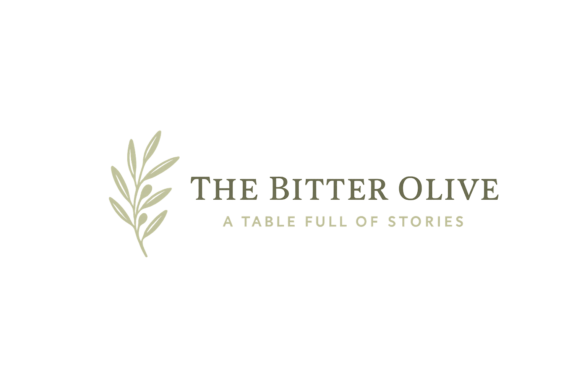My mum spent many years of her childhood living with her family in Libya, where my grandpa used to work. Their friends there were from different nationalities and my grandma picked up more than a few dishes there that she added to her repertoire of endless recipes. I must say though that the Libyan dishes my mum prepares are some of my favorite and this soup is perfect and is a full meal on its own. Deep inside, I have always felt grateful they stayed in Libya, as it made me experience dishes I wouldn’t have otherwise known about.
Although, we enjoy this soup so much, mum almost exclusively prepares it in Ramadan, especially when we have people over for Iftar and almost always on the first day of Ramadan, which makes it even more special. Everyone who tastes the soup raves about it, even my husband who usually hates everything that has lots of tomato paste.
When I decided to write this recipe, I asked mum what this soup was called in Libya, as there is no way they’ve called it Libyan soup. To my surprise, it was only called “shorba”, which is the Arabic for soup. I read in a blog post of a Libyan blogger that when Libyans talk about soup, this is the one, and there is no confusion as to which soup they are referring to. This is how popular this soup is. It sums up all the flavors of Libya in one dish.

Traditionally, this soup is cooked with lamb, but we cook it with beef at home. The beef needs to be very thinly sliced. Also, most of the variations I saw have chickpeas, but it is not found in the version my grandma used to cook. The dried mint added at the end of the cooking is what gives this soup its unique taste, so please do not omit (check my post on how to dry your mint at home if you do not have access to dried mint). Additionally, Libyans use a lot of tomato paste in their cooking, and this recipe is no exception. If you plan to cook this, please try to use the best tomato paste you can find, preferably all natural with no added preservatives.
You’d notice that this recipe calls for Libyan spice mix called Hrarat. Believe it or not, even though my mum and aunts haven’t set foot in Libya for over 30 years now, they still receive their Libyan spice from their friends in Libya! I will at some point write a post about how to make your own blend, but for now if you can’t find the Libyan mix replace with ¼ tsp each of cinnamon, black pepper, ground ginger and cardamom.
To make the soup, start by sautéing the onions on medium heat until the onion is translucent. Then add the thinly sliced meat, bouillon cube, spices and ½ tsp salt and cook for 5 minutes, stirring continuously.

Then add the chopped cilantro and parsley and cook for an additional 2 minutes.
Add the tomato paste and cook for 2 minutes.

Add the water, the remaining ½ tsp salt and simmer for 15 minutes.
Add the orzo and cook for an additional 20 – 25 minutes, or until meat is tender. Then add the dried mint and serve immediately.

I assure you once you try this soup, it will easily become your favorite as it is full of flavors and is heartwarming. This delicious soup is usually served alongside our perfect cheese sambousek.
Libyan Soup
Ingredients
- 200 g stewing beef very thinly sliced
- 150 g tomato paste
- ¼ cup orzo
- 1 medium onion finely diced
- 2 tbsp vegetable oil
- 1 cup cilantro finely chopped
- 1 cup parsley finely chopped
- 1 bouillon cube
- 1 tsp salt divided
- ¼ tsp turmeric
- ¼ tsp paprika
- ¼ tsp salma’s spice see page under Arabic pantry for the recipe
- 1 tbsp Libyan spice mix or see note
- Pinch of Aleppo pepper
- 2 tsp dried mint
- 5 cups of water
Instructions
- Add oil to a large pot and sauté onions on medium heat until translucent.
- Add the meat, spices, bouillon cube and ½ tsp salt and cook for 5 minutes, stirring continuously.
- Add the chopped cilantro and parsley and cook for 2 minutes.
- Add the tomato paste and cook for an additional 2 minutes.
- Add water and remaining ½ tsp salt and simmer covered for 15 minutes.
- Add the orzo and continue simmering for 20 – 25 minutes, or until meat is very tender.
- Add dried mint and serve immediately.




11 thoughts on “Libyan Soup”
You have no idea how much I’ve wanted this recipe! It’s my absolute favorite Arabic dish. Thanks!
Hi Leigh, thank you so much for giving the recipe a try and I am so happy you liked it. It is also one of my most favorite dishes as well!
I’m intrigued by this recipe as it’s so far removed from what I would call “Libyan Soup”, a dish I have made many, many times, and one which sits high on my list of favourite soups.
The main ingredient of Libyan soup is lamb. Beef is a totally different flavour. I agree that the addition of chopped mint at the end of the recipe is essential, but that’s because mint complements lamb so beautifully. I can’t recall any recipe in which I have added mint to beef. Also the addition of orzo, an Italian pasta, seems very un-Libyan. I have always used couscous. I’m sure your recipe tastes good, but I don’t think it can really be labelled as traditional Libyan Soup! I would recommend Delia Smith’s recipe for Libyan Soup to anyone who wants to try an authentic version. You will not be disappointed!
Hi Frances, thank you for sharing your thoughts. I wonder given your strong opinion if you have any connection to Libya or its cuisine. My mom spent much of her childhood in Libya, and this recipe is based on what she and many others in Libya cooked. Libyan cuisine, like many others, has been shaped by regional and historical influences, including Italian, which is why orzo appears in this version. In fact, you’d fine many authentic Libyan dishes prepared with different types of pasta. It’s important to recognize that food, much like culture, can be diverse and adaptive, with no one “right” way to prepare a traditional dish. Especially in these times, it’s valuable to listen and learn from each other’s experiences rather than assuming a singular viewpoint. I invite you to try this recipe with an open mind—you might find it offers a delicious take on an authentic Libyan favorite.
Libya was an Italian colony after WW I for a while. Finding Italian influence and ingredients in the food is very common. Kind of like Vietnamese “French” Sandwiches (Bahn Mi) or Base Jigae (US Army base surplus stew) in Korea.
Thank you for posting this recipe! And thank you for the notes on Hrarat. I would be interested in reading more on this mix and how you make it.
Thank you so much for stopping by Jen and I am so glad you like the recipe. I will write a post about Hrarat soon 🙂
IS there any way to purchase the Libyan spices directly from Tripoli? I’ve been trying to source this forever (Since I ran out!) Thanks.
Hi Dean,
Thanks for stopping by, we get the spices from family friends in Libya and they’re homemade. I will ask around and let you know if they know of any vendors who ship abroad.
Ayah